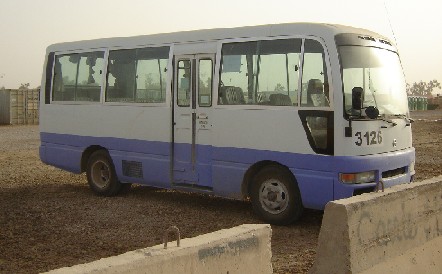I live near the United Nations compound. When I first arrived in Iraq in January 2005, I never heard any noises from their compound. It was eerily silent. Apparently, they had pulled out almost everyone after the bad guys attacked them in August 2003.
 Shortly after the attack, the Secretary General said that the United Nation would not return until the security of its staff was assured.
Shortly after the attack, the Secretary General said that the United Nation would not return until the security of its staff was assured.Nevertheless, over the last seven months, I have slowly heard more and more noise from the United Nations compound. Occasionally I have heard the sounds of people having parties, and every so often I hear the sounds of soldiers and guards practicing with their weapons. Almost every time I leave the compound I now see a soldier (Mostly Fijians) wearing a blue United Nations badge. Whenever I take a Rhino bus to the airport, I generally see a handful of United Nations civilians.
I think the United Nations was trying to keep a low profile, but it is hard to deny that over the last few months it has significantly increased the number of agencies, and consequently the number of people, it has in Iraq.
Posted by alohafromtim
at 11:39 PM EDT

 Thankfully, the US military has established barber shops at military exchanges throughout Iraq, and the U.S. State Department has built a small barber shop in the Palace. Hair cuts inside the Green Zone only cost $3, and for the most part, they aren't too bad considering that fashion is not the top concern in Iraq and most people are getting military flattops.
Thankfully, the US military has established barber shops at military exchanges throughout Iraq, and the U.S. State Department has built a small barber shop in the Palace. Hair cuts inside the Green Zone only cost $3, and for the most part, they aren't too bad considering that fashion is not the top concern in Iraq and most people are getting military flattops. The Second Iraq Emergency Supplemental Appropriations Bill (Public Law 108-106) requires the Bush Administration to submit a report to Congress every 90 days that updates the estimates and assumptions for the $18.4 billion appropriated to help rebuild Iraq. Preparing this report, which is known as the
The Second Iraq Emergency Supplemental Appropriations Bill (Public Law 108-106) requires the Bush Administration to submit a report to Congress every 90 days that updates the estimates and assumptions for the $18.4 billion appropriated to help rebuild Iraq. Preparing this report, which is known as the 
 Upon arriving at BAIP, every passenger must pass through a small passport control area. Americans can move quickly through the passport control area if they have a military ID badge. After passing through the baggage area and customs, passengers spill out into a large open area, where foreigners mill around in a dogged attempt to find the security detail that will take them to their next destination. Every time a flight arrives, there is at least one person who has no idea where their security team is, and because calling anyone in Iraq is nearly impossible without a cell phone that works in Iraq, many passengers simply sit down and wait because they have no way to contact their security team.
Upon arriving at BAIP, every passenger must pass through a small passport control area. Americans can move quickly through the passport control area if they have a military ID badge. After passing through the baggage area and customs, passengers spill out into a large open area, where foreigners mill around in a dogged attempt to find the security detail that will take them to their next destination. Every time a flight arrives, there is at least one person who has no idea where their security team is, and because calling anyone in Iraq is nearly impossible without a cell phone that works in Iraq, many passengers simply sit down and wait because they have no way to contact their security team. 